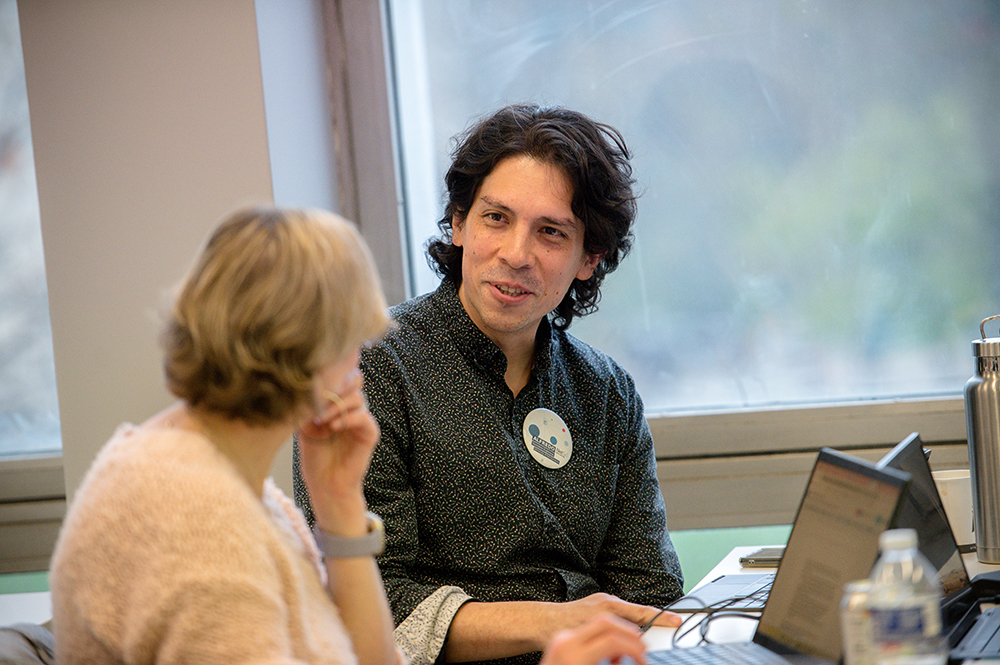
When Research and Data Services Librarian Alfredo González-Espinoza arrived at Carnegie Mellon University Libraries, he was excited to find his place in the new environment — and a little nervous, too. As a newly appointed faculty librarian, he was stepping into his first faculty role. And while he was ready for the challenge, he knew that navigating the unfamiliar landscape would require new skills and knowledge.
Then he connected with STEM Librarian Melanie Gainey.
Gainey, an experienced librarian and researcher who has worked at CMU for eight years, remembers what it was like to begin her journey at the Libraries. “When I joined the Libraries, I was new to librarianship and really benefited from the guidance and support of my colleagues,” she said. “It's really meaningful to me that I can now do the same for others — to help ease their transition and support them as they navigate their new professional paths.”
Their connection wasn’t accidental. The two were paired through the Libraries’ Faculty Mentorship Program, a growing initiative designed to help librarians pursue professional development and grow as skilled information professionals.
People-Centered Program
When Organizational Development Manager Kelly Woessner joined the Libraries nearly four years ago, she noticed a gap. “There had been past attempts to put together a program, but nothing had really taken hold for our faculty,” she recalled. Woessner, together with then-Associate Dean for Faculty Matt Marsteller, sketched out some loose guidelines for a mentoring program. It wasn’t formal, and intentionally so.
“We didn’t want mentoring to feel like another job,” Woessner added. “We wanted it to be something that made people feel more connected — not obligated.”
The program began with a trial run. Senior or principal librarians who had gone through at least one reappointment were matched with new faculty. They were encouraged to meet monthly, with check-ins every few months to see how things were going.
González-Espinoza and Gainey’s pairing came as the program moved into its second year. By then, the structure had evolved — just enough to offer guidance without rigidity. Mentors were now equipped with best practices, and a kickoff meeting co-hosted by Libraries leadership set the tone. But the emphasis remained on informal, collegial conversations: walks, coffee chats, emails exchanged between instruction sessions.
“Melanie might specialize in a different field, but her background in scientific research is very similar to mine,” said González-Espinoza. “It was a great decision to pair us together. Knowing that she is available and ready to help has been very helpful.”
Mentorship as a Map
For González-Espinoza, those first few months at CMU were made easier by having a guide. “Melanie has been very willing to share her experience with me, from what she’s learned in her years as a Librarian and advice that she thinks will be helpful,” he said. “We’ve talked about how to balance the workload and responsibilities, and she’s also been able to guide me through processes like getting reimbursed for purchases.”
Gainey, too, found the experience enriching. “There’s a lot of mutual benefit in mentor-mentee relationships. Many of the topics we discuss — like balancing responsibilities across librarianship, teaching, and research; preparing a strong casebook for reappointment or promotion; or building a broader mentorship network — are relevant at all stages of a career. These conversations not only hopefully support mentees, but also make me reflect on my own career and provide opportunities for peer accountability,” she said.
Mentorship also plays a role in navigating the Libraries' faculty reappointment and promotion process. Librarians are reappointed every three years, moving toward a five-year cycle as they advance. To do so, they must demonstrate contributions in research, librarianship, and service — and mentors help them sort activities into those buckets and put together materials for a reappointment committee to review.
As a result, the program’s impact extends beyond simple growth. As Woessner describes it, “This is about retention. It’s about helping new faculty not just survive, but thrive. If you don’t know where to begin with a process like that, it’s easy to feel lost. Mentorship helps new faculty sort through what they’re already doing and how it fits, and prepares them for the next step of their career.”
A Culture of Investment
Today, the CMU Libraries Faculty Mentorship Program is still intentionally informal, but with stronger scaffolding. More documentation exists. Templates and annual best practices help pairs stay on track. And the community has grown — some pairings from the first year, like Social Sciences Librarian Sarah Young and STEM Librarian Lauren Herckis or Arts and Humanities librarians Kristin Heath and Charlotte Kiger Price, are still meeting, while additional pairs are connected each time a new faculty member joins the Libraries.
To celebrate the community of mentors, the Libraries hosted a mentorship brunch this February, a chance for mentors and mentees — new and continuing — to network and reflect.
González-Espinoza and Gainey’s experience reflects something essential about CMU Libraries: the belief that people are a valuable asset. “This program works,” Woessner said, “because we have amazing veteran faculty who are invested not just in their own journeys, but in those of others. And we have new faculty who are curious, passionate, and ready to grow.”
As for González-Espinoza, the program has helped show him the dedication CMU has for its employees. “If someone is hired, it’s because they’re wanted as a long-term investment,” he explained. “This type of effort really confirms that — it shows a commitment to integrating employees into the workflow and the community in the best way possible.”
Gainey agreed. “In STEM research, access to mentorship can be highly variable so I didn't have high expectations when I joined the Libraries,” she remembered. “But I love working in an environment where meaningful mentorship is not only valued but actively supported. I really appreciate that the Libraries has made a strong commitment to mentorship."
